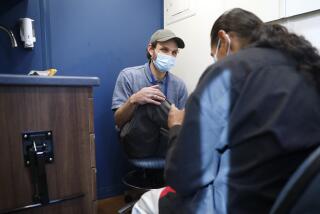Firm Claims Isolation of Hepatitis Virus in Blood
- Share via
A Northern California biotechnology firm announced Tuesday that it has identified the virus that causes the most common form of blood-borne hepatitis and is developing a blood test that could prevent tens of thousands of Americans a year from contracting the virus through blood transfusions.
Officials of Emeryville-based Chiron Corp. said at a Washington news conference that their discovery will also spur research toward a vaccine against the sometimes debilitating liver ailment, which is called “non-A, non-B hepatitis.”
This is a solution to “one of the great unsolved infectious disease problems,” Edward E. Penhoet, Chiron’s president, said.
But some leading liver researchers were cautious about Chiron’s findings, which have yet to be published in a medical journal or presented at a medical meeting.
“I suspect they may really have something, but there are over 30 reports of people who believe they have isolated the non-A, non-B hepatitis virus over the last seven years,” said Dr. Gary L. Gitnick of the UCLA Medical Center, who in 1972 was one of the first scientists to describe the existence of the disease. “None of them have been confirmed.”
When pressed on this point, Michael Houghton, the Chiron scientist who led the research team, acknowledged that the company’s data fail to meet the rigorous standards that are usually required to prove that a microorganism causes a disease. Chiron has not, for example, grown the virus in the laboratory or used the identified virus to reproduce the disease by inoculating test animals.
Nevertheless, Chiron’s announcement is likely to trigger wide medical interest, because current blood tests to detect the mysterious illness miss many more cases than they detect.
“It will allow a direct diagnosis of the disease,” said Lacy Overby, a former Chiron vice president and a leading authority on hepatitis blood tests. “I’ve been through all the other false alarms and my opinion is this is it (the real thing).”
“It is not ironclad proof, but it is by far the strongest evidence to date (that the virus has been found),” said Dr. Harold Varmus of the University of California Medical Center in San Francisco, who heard a presentation of some of the data at a university seminar Monday.
Non-A, non-B hepatitis is so called to distinguish it from other forms of hepatitis with known causes. Transfusion recipients who contract the disease often have no symptoms, but can develop severe fatigue, nausea and jaundice.
Serious Liver Problems
The illness may also result in chronic liver inflammation and, after many years, the life-threatening scarring of the liver called cirrhosis.
Universal blood screening with tests able to detect about 40% of the tainted transfusions began in late 1986. Before then, about 150,000 cases of transfusion associated non-A, non-B hepatitis and 7,500 cases of cirrhosis occurred in the United States each year. The risk of contracting the AIDS virus through a blood transfusion is minimal by comparison.
While researchers have suspected that non-A, non-B hepatitis was caused by a virus for more than 10 years, they have been repeatedly frustrated in their efforts to grow the virus in the laboratory.
Chiron decided to use sophisticated genetic engineering techniques to overcome the failure of traditional research methods, Houghton said.
Genetic Material Produced
The researchers took an indirect approach. First, they produced large amounts of the foreign genetic material contained in the blood serum of non-A, non-B hepatitis patients.
Then they inserted these genes into bacteria to produce large amounts of the proteins coded for by these genes.
Finally, they tested these genetically engineered proteins to see if they reacted with antibody molecules in the patient’s blood serum. The researchers suspected that such antibody molecules had been produced by the body’s immune system in response to the mysterious viral infection.
“The gamble paid off,” Houghton said in a telephone interview. In the spring of 1987, after five years of work, the Chiron researchers identified genes that appeared to be part of the non-A, non-B hepatitis virus. The proteins produced by these genes reacted specifically with antibodies in the patients’ serum.
Cloned Material
Subsequently, Houghton said, his research group has cloned the genetic material of the virus and has begun to determine its molecular structure. They have also developed a “prototype” blood test that has detected antibodies to the non-A, non-B hepatitis virus in about 50% of 40 or so blood samples from patients tested to date.
Later this year, Chiron expects to seek U.S. Food and Drug Administration approval for human trials of a more advanced diagnostic blood test.
“We felt we had to make an announcement,” Houghton said. “We had reached the point where we felt we were capable of picking up antibodies in infectious blood. . . . We thought this was of significant commercial interest and the company had to make a statement to our shareholders.”
However, scientists seeking to confirm the work will likely have to wait for at least several months to see if the research team publishes such key scientific data as the molecular structure of the virus or succeeds in its attempts to grow the virus in the test tube or in laboratory animals.
Developed a Vaccine
Chiron is a small biotechnology company, with total revenues of $13.8 million for the nine months ending in January, 1988. It is best known for its development of a genetically engineered vaccine against hepatitis B and AIDS vaccine research, for which it received a $1.55-million state grant in 1987.
Chiron’s stock gained $1.75 a share Tuesday to close at $16.50 on a heavy volume of 724,700 shares. On Monday, only 81,400 shares of the stock were traded.
In addition to Chiron scientists, the non-A, non-B hepatitis research has involved scientists at the federal Centers for Disease Control, Ciba-Geigy of Summit, N.J., and Ortho Diagnostic systems, a subsidiary of Johnson & Johnson of New Brunswick, N.J.






